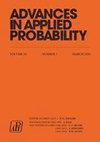阿基米德copula控制的发展序列序统计量的有序性和老化性
IF 1.2
4区 数学
Q3 STATISTICS & PROBABILITY
引用次数: 1
摘要
开发的顺序顺序统计(DSOS)在对具有依赖组件的系统的生命周期进行建模时非常有用,其中一个组件的故障会影响其余幸存组件的性能。我们研究了单样本和双样本情况下DSOS的一些随机比较结果。此外,我们研究了DSOS的各种老化特性。我们给出了许多有用的结果,用于广义有序统计量和具有相关随机变量的普通有序统计量。最后,给出了一些数值算例来说明所提出的结果。本文章由计算机程序翻译,如有差异,请以英文原文为准。
Ordering and ageing properties of developed sequential order statistics governed by the Archimedean copula
Developed sequential order statistics (DSOS) are very useful in modeling the lifetimes of systems with dependent components, where the failure of one component affects the performance of remaining surviving components. We study some stochastic comparison results for DSOS in both one-sample and two-sample scenarios. Furthermore, we study various ageing properties of DSOS. We state many useful results for generalized order statistics as well as ordinary order statistics with dependent random variables. At the end, some numerical examples are given to illustrate the proposed results.
求助全文
通过发布文献求助,成功后即可免费获取论文全文。
去求助
来源期刊

Advances in Applied Probability
数学-统计学与概率论
CiteScore
2.00
自引率
0.00%
发文量
64
审稿时长
6-12 weeks
期刊介绍:
The Advances in Applied Probability has been published by the Applied Probability Trust for over four decades, and is a companion publication to the Journal of Applied Probability. It contains mathematical and scientific papers of interest to applied probabilists, with emphasis on applications in a broad spectrum of disciplines, including the biosciences, operations research, telecommunications, computer science, engineering, epidemiology, financial mathematics, the physical and social sciences, and any field where stochastic modeling is used.
A submission to Applied Probability represents a submission that may, at the Editor-in-Chief’s discretion, appear in either the Journal of Applied Probability or the Advances in Applied Probability. Typically, shorter papers appear in the Journal, with longer contributions appearing in the Advances.
 求助内容:
求助内容: 应助结果提醒方式:
应助结果提醒方式:


